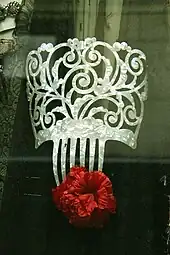Peineta (comb)
In Spain and in the rest of the Hispanic world, a peineta is a large decorative comb usually worn under a mantilla, or lace head covering.[1]

The hair ornament, worn by women, consists of a convex body and a set of teeth that affix it to hair worn in a bun. The peineta was once made of tortoise shell, but is now usually made of synthetic materials such as acrylic or plastic.[2]
The origin of the peineta goes back to the 19th century in Spain, but there is evidence of its use on the Iberian Peninsula as early as the 5th century BCE and in other areas from the 17th century. It is used today primarily during special occasions such as weddings, bullfights, Holy Week processions, and traditional performances of flamenco music.
Between the mid-1820s and the mid-1830s, the fashion for a new type of headpiece known as peinetón—derived from the Spanish peineta—became widespread among elite women in the Río de la Plata cities of Buenos Aires and Montevideo, and had a great impact on the society of the time.[3][4] Peinetones were characterized by their overly large size, measuring up to 120 centimetres (3 feet 11 inches) in height and width at the height of their popularity.[5]
The peineta is usually worn with a mantilla, a veil worn over the head and shoulders. The mantilla is also a common element of some Valencian and Andalusian costumes.
In some countries, such as Chile, it is known as peinetas a los peines, while in the Philippines it is referred to as payneta, often much smaller than its Iberian ancestor and may be bejewelled or made of gold.
Etymology
From Spanish 'peinar' and Latin 'pectinare' "to comb".[6]
References
- Ford, Richard. (1855) A Handbook for Travellers in Spain Volume 1. J. Murray.
- "The ornamental combs or "La Peineta"". Spain Traditions. Retrieved 29 August 2009.
- Root, Regina A. (2010). "Fashion as Presence". Couture and Consensus: Fashion and Politics in Postcolonial Argentina. Cultural Studies of the Americas. University of Minnesota Press. pp. 61–94. ISBN 978-081-664-793-4. Retrieved September 24, 2021 – via Google Books.
- Perri, Serafina (2016). Cuando volaban peinetones en la Alameda: Cuestiones de clase, género y raza, antes y durante el primer gobierno de Juan Manuel de Rosas (Buenos Aires, 1825–1840) (PDF) (master's thesis) (in Spanish). San Martín: Instituto de Altos Estudios Sociales. Universidad Nacional de San Martín. Retrieved June 18, 2022.
- Saulquin, Susana (2006). Historia de la moda argentina (in Spanish). Buenos Aires: Emecé Editores. p. 43. ISBN 978-950-042-752-4.
- "A Comprehensive Etymological Dictionary of the Spanish Language..." - Edward A. Roberts